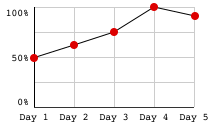If is divergent, then we say that is conditionally convergent.
Mastering Absolute and Conditional Convergence in Series Dive deep into absolute and conditional convergence, crucial concepts for analyzing infinite series. Enhance your calculus skills and tackle advanced mathematical problems with confidence.
Free to Join!
Easily See Your Progress
 We track the progress you've made on a topic so you know what you've done. From the course view you can easily see what topics have what and the progress you've made on them. Fill the rings to completely master that section or mouse over the icon to see more details.
We track the progress you've made on a topic so you know what you've done. From the course view you can easily see what topics have what and the progress you've made on them. Fill the rings to completely master that section or mouse over the icon to see more details.Make Use of Our Learning Aids
Earn Achievements as You Learn
 Make the most of your time as you use StudyPug to help you achieve your goals. Earn fun little badges the more you watch, practice, and use our service.
Make the most of your time as you use StudyPug to help you achieve your goals. Earn fun little badges the more you watch, practice, and use our service.Create and Customize Your Avatar
 Play with our fun little avatar builder to create and customize your own avatar on StudyPug. Choose your face, eye colour, hair colour and style, and background. Unlock more options the more you use StudyPug.
Play with our fun little avatar builder to create and customize your own avatar on StudyPug. Choose your face, eye colour, hair colour and style, and background. Unlock more options the more you use StudyPug.
If is divergent, then we say that is conditionally convergent.
Introduction
Infinite series and conditional convergence are fundamental concepts in the study of infinite series. As introduced in our video, understanding these types of convergence is crucial for analyzing series behavior. Absolute convergence occurs when a series converges even after taking the absolute value of each term, indicating strong convergence. Conditional convergence, on the other hand, applies to series that converge but become divergent when absolute values are used. This article delves into the definitions, examples, and real-world applications of both absolute and conditional convergence. We'll explore how these concepts help determine whether a series is convergent or divergent, and their significance in various mathematical and practical contexts. By mastering these concepts, you'll gain valuable insights into series analysis, enhancing your problem-solving skills in calculus and related fields. Join us as we unravel the intricacies of absolute and conditional convergence, essential tools for any aspiring mathematician or engineer.
Here are some frequently asked questions about absolute and conditional convergence:
-
What is the difference between absolute and conditional convergence?
Absolute convergence occurs when the series of absolute values of terms converges. It implies that the original series also converges, regardless of the order of terms. Conditional convergence, on the other hand, happens when a series converges, but the series of absolute values diverges. Conditionally convergent series are sensitive to the order of terms.
-
Can a series be both absolutely and conditionally convergent?
No, a series cannot be both absolutely and conditionally convergent. If a series is absolutely convergent, it is not conditionally convergent. Absolute convergence is a stronger form of convergence that implies convergence of the original series.
-
How do you test for absolute convergence?
To test for absolute convergence, take the absolute value of each term in the series and apply convergence tests (such as the ratio test, root test, or comparison test) to this new series. If the series of absolute values converges, the original series is absolutely convergent.
-
What is an example of a conditionally convergent series?
A classic example of a conditionally convergent series is the alternating harmonic series: Σ((-1)^(n+1) / n). This series converges to ln(2), but the series of its absolute values (the harmonic series) diverges.
-
Why is understanding absolute and conditional convergence important?
Understanding these concepts is crucial in mathematical analysis, calculus, and various applications in physics and engineering. It helps in determining the behavior of infinite series, analyzing power series, and solving problems involving Fourier series and transforms. This knowledge is essential for developing accurate numerical methods and understanding the limitations of series manipulations.
Understanding absolute and conditional convergence is crucial in advanced calculus, but it requires a solid foundation in several prerequisite topics. To fully grasp this concept, students must first master the fundamentals of convergence and divergence of normal infinite series. This knowledge forms the basis for exploring more complex convergence types.
A strong understanding of absolute value functions is essential, as absolute convergence involves the convergence of a series when all terms are made positive. This concept is closely related to conditional convergence, where a series converges but its absolute value series may not.
The alternating series test is particularly relevant when studying conditional convergence, as many conditionally convergent series are alternating. Similarly, understanding the divergence of harmonic series provides valuable insights into the behavior of certain types of series and their convergence properties.
Several convergence tests are crucial for determining both absolute and conditional convergence. The ratio test and root test are powerful tools for assessing absolute convergence. The comparison and limit comparison tests help in comparing the behavior of a given series to a known convergent or divergent series, which is invaluable in determining convergence types.
The integral test offers another method for evaluating series convergence, especially useful for series involving functions with integrals. This test bridges the gap between discrete series and continuous functions, enhancing our understanding of convergence behavior.
Lastly, knowledge of radius and interval of convergence with power series is crucial. This topic extends the concept of convergence to power series, which is a natural progression from understanding absolute and conditional convergence of simpler series.
By mastering these prerequisite topics, students will be well-equipped to tackle the complexities of absolute and conditional convergence. Each concept builds upon the others, creating a comprehensive understanding of series behavior and convergence properties. This foundational knowledge not only aids in grasping the main topic but also prepares students for more advanced mathematical concepts in calculus and analysis.



